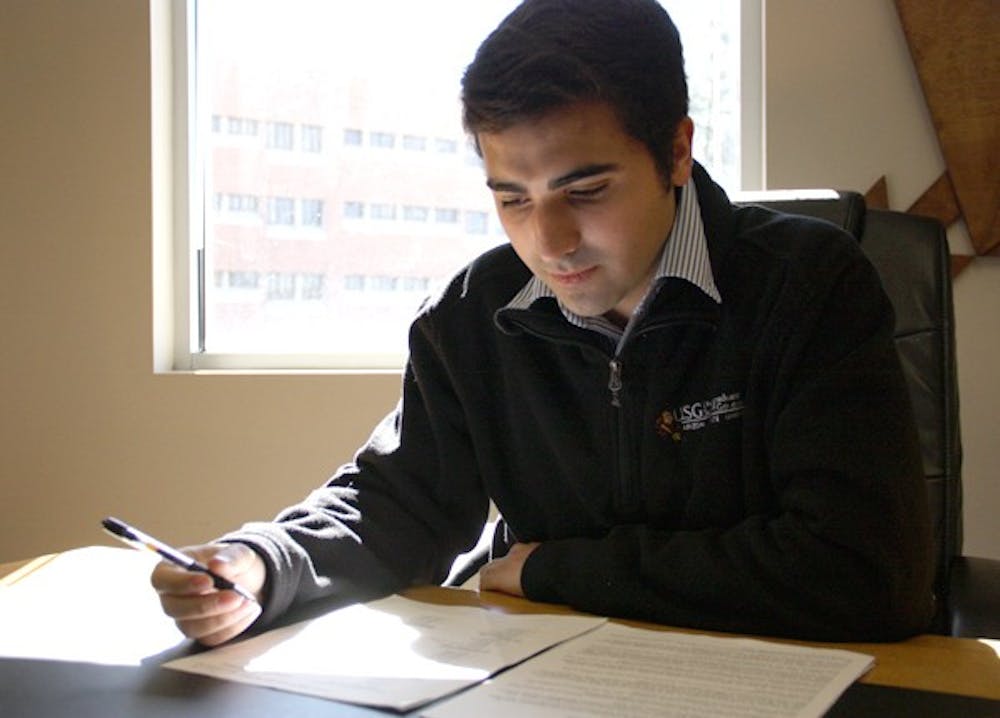As a year plagued by inter-office drama, legislation and lawsuits draws to a close, the Arizona Students’ Association is close to splitting with the elected student governments of all three public universities.
The student government at NAU voted earlier this month to separate itself from ASA, and UA will likely vote in the fall, said Morgan Abraham, an engineering management senior and the president of the Associated Students of UA.
“I’m not really in a big rush to make a decision,” Abraham said. “We’re not likely to make it until the fall, when everyone’s on campus and has had a chance to think it through.”
ASA, an advocacy group overseen by a board of student directors, began representing students in 1974.
Until the past year, its board of directors consisted of the student body presidents from each campus of each university, representatives from each university’s graduate and professional student associations and additional members appointed by the student body presidents.
In late September, former undergraduate student body presidents Mark Naufel (Tempe), Joseph Grossman (Downtown) and Jeffrey Hebert (Polytechnic) stepped down from their positions on ASA’s board of directors. Luke Webster, the former president of Undergraduate Student Government West, declined to take his position at the beginning of the year.
At the time, Naufel said he had received an email from the then-executive director of ASA threatening legal action against him if he continued to question a $2 fee levied on each student each semester.
The fee contributed to ASA’s $602,908 budget, and it was used in 2012 to help fund ASA’s lobbying efforts for Proposition 204, a failed attempt to extend a temporary voter-approved tax increase to fund education.
Prior to 1998, the Arizona Board of Regents solely funded ASA because the student government’s bylaws prevented them from using their money for advocacy purposes, according to ASA’s website.
The association ran referenda on each campus for a $1 fee, and similar referenda 10 years later increased the fee to $2. ASA uses this money to fund its advocacy efforts, but its fiscal year 2013 budget showed that 62 percent of the funds went to paying the association’s professional staff, a group of nine adults that remains relatively constant as the student leadership changes each year.
Changes to ASA’s rules on the makeup of the board of directors led NAU’s student government to sever ties and UA’s government to consider it, Abraham said.
Instead of allowing the incoming elected student body presidents to appoint members to the board, the outgoing board directors will select an undergraduate and graduate representative from each campus.
In addition, the new bylaws allowed for just one undergraduate student government president from each university to sit on the board. ASU has four undergraduate student body presidents, while UA has two and NAU has one.
The student governments at NAU and UA had both already hired directors for the next year, and these individuals will be assigned to different positions.
“That was a big change,” Abraham said. “The organization’s been like this for 37 years.”
He said he hasn’t received a clear explanation of why ASA changed its rules, but that it may relate to changes he, NAU student body president Makenzie Mastrud and USG Tempe president Jordan Davis planned.
“We came into this organization with ideas on how to better it,” Abraham said.
Davis, a political science junior, said he considered serving on the ASA Board of Directors when he was first elected in April, despite the struggles USG had with ASA during the past year.
He and the other presidents wanted to work within the organization to fix structural problems that had become apparent in the last couple of years, Davis said, adding that he wanted to make sure the $400,000 in student fee money that ASA still had was put to good use.
After ASA changed its bylaws, Davis said he declined his board seat. He no longer receives any communication from ASA.
“After they changed the bylaws to essentially eliminate our voice, which was done behind closed doors, I was done,” Davis said.
He said he’s been talking with Abraham and Mastrud to coordinate any lobbying efforts for the next year between the student government’s policy departments, without using ASA as a go-between.
Before being elected president, Davis served as USG’s Tempe Liaison, where he represented ASU’s needs to the city.
“We showed that students were effective at lobbying without a professional staff,” Davis said.
While ASA representatives remain on campus and still receive support from the Graduate and Professional Student Association, the association will receive no student fee money. ASU’s members have moved out of USG’s offices on the third floor of the Memorial Union and USG will be recruiting its own interns for lobbying purposes.
“We’d hopefully be able to create a strong lobbying presence within our own policy departments,” Davis said.
Reach the managing editor at julia.shumway@asu.edu or follow @JMShumway on Twitter.
Like The State Press on Facebook and follow @statepress on Twitter.




